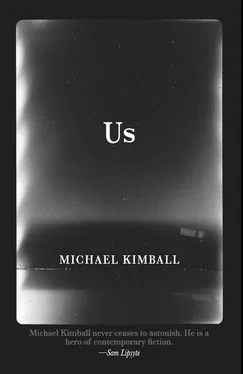I got out of our bed and went around to her side of it. She turned the bedcovers back off her legs and turned her legs out so that they were hanging down over the side of the bed. I set her walker down in front of her legs. She pulled and pushed herself up with her arms so that she could stand up. She walked with her walker into the bathroom and I waited for her outside the bathroom door. I listened for the water in the toilet bowl and for the water in the bowl of the bathroom sink.
She opened the bathroom door back up. I carried a chair from our bedroom into the bathroom and set it down in the bathtub. I turned both the hot water and the cold water on until the water got warm enough for us. She tried to lift her arms up so that I could help her lift her nightgown up off her body and over her head. I took my nightclothes off too.
I held onto her arms for her so that she could step over the edge of the bathtub. I waited for her to sit down on the chair before I climbed into the bathtub after her and pulled the shower curtain along the length of the bathtub.
She could make the bar of soap lather up in her hands, but she couldn’t wash most of her body with it. She couldn’t reach below her knees to her feet or around to her back. Her arms and her hands still felt too heavy for her to hold them up to her head so that she could wash her hair. I lathered the shampoo up in my hands and worked it into her thick gray hair. I rinsed the shampoo out of her hair and off the rest of her body.
I turned the water off and pulled the shower curtain back. I stepped out of the bathtub and held onto her arms so that she could step out of the bathtub too. I held the bath towel out in my arms for her and she stepped out into it. I stepped back and she held her arms out so that I could dry them off for her.
I wrapped the bath towel around her legs and patted them down with it until they were dry too. Her skin was too dry. There was dead skin on her arms and her legs and her back and her face. We had to peel all of it off her so that she wouldn’t die any faster than she already was.
I hung her bath towel up on the towel rack and dried myself off with another bath towel. I helped her step into her underwear and pulled them up her legs. I helped her get her arms through her bra straps and hooked her bra together in the back. I helped her push her arms through the sleeves of her housecoat and zipped it all the way up to her neck.
We walked her over to her dressing table so that she could sit down on her chair at her dressing table. She wanted to brush her hair out. She could hold onto the hairbrush for a few brushstrokes, but then her arm would get too tired. Her hair was almost dry by the time that she was done brushing it out.
I walked back into the bathroom and got her walker back out for her. She walked down the hallway and into the kitchen with it and I walked behind her. I pulled a kitchen chair out from the kitchen table for her and she sat down to eat.
Nobody had brought any trays of hospital food into our bedroom, but there wasn’t any bread or fruit or milk or anything else fresh in our house either. We were going to have to feed ourselves things that didn’t get too old too fast.
I got a box of dry cereal down from the cupboard. I got spoons out of the silverware drawer and cereal bowls down from another cupboard. I filled the bowls up with cereal and I waited for her to start to eat first. I watched her put the spoon in the bowl and then bring the spoon up to her mouth. I watched her chew and swallow the food and then I did it with her too.
I put the cereal bowls and the spoons into the kitchen sink and rinsed some water over them. I sat back down at the kitchen table with her and we looked around the kitchen. We looked at her walker and we looked at each other. We knew that it didn’t matter what or how much we ate. We knew that we wouldn’t be alive and be together for much longer.
How We Slowed Our Time Down
We found ways to make our days longer. We followed the sun around our house — from our bedroom and the bathroom in the morning, to the kitchen through noon, the living room through the afternoon, and the dining room for the evening.
At night, we turned all the lights in every room of our house on. We turned the lights on the front porch on. We turned the lights on the back porch and over the garage on too. We wanted to keep the darkness that surrounded our house and us as far away from us as we could.
We wanted it to be daytime all the time. We didn’t need much sleep anymore anyway. She had saved so much of it up while she was sleeping in the hospital and I wanted to be awake for the rest of the time that she was going to be alive.
We unplugged all the clocks and anything that had a clock on it. We used our extra time awake to slow the rest of our time down. We cooked and ate and sat and talked and waited and moved and walked and we did it all slowed down. There wasn’t anything else that we wanted to do but be awake and alive with each other.
How I Rubbed Her Wrinkles Out
I would rub her back and her arms and her legs and her feet. My hands could rub the wrinkles out of her skin and make her feel younger, so that she could stay alive longer. We were trying to stretch the rest of our lives out.
Some of the Things that She Couldn’t Do Anymore
We were afraid to close our eyes to go to sleep so we stayed awake for those days that we were back at home. We tried not to look away from each other too much or even blink and we did other things to help us stay awake too. We kept touching each other on the arm or the hair or the face. We kept sitting up or getting up and standing up. We kept setting this egg timer that we had so that it would keep going off and keep us up too.
We ate to stay alive and awake too. We ate all the food inside the cupboards and the pantry and all the food inside the refrigerator and the freezer. We ate everything that we had that was in boxes and jars and bottles and cans and plastic bags. We ate boxes of cereal, cans of fruit and cans of soup, bags of frozen vegetables, and packages of frozen meat. We ate packages of cookies, boxes of crackers, and bags of potato chips.
We boiled water to make coffee and tea and to cook boxes of pasta and bags of rice. We defrosted frozen orange juice and frozen lemonade and drank it from pitchers. We baked layer cakes and loaves of bread with the flour and the sugar that was left in the jars on top of the kitchen counter and with the packages of yeast that made it all rise up.
All of it was food that didn’t get too old too fast. But it took us a long time to get up and get to the kitchen to make our food, to sit down and eat our breakfast and our lunch and our supper, to get back up and clean up the pots and pans and the dishes and the silverware and to put everything away again. We moved through our house and our lives so slowly then.
But my wife wasn’t getting any better anymore for those days that we were back at home. She began to forget how to live in our house or with me anymore. She forgot what things were or what they were for. We made labels for the refrigerator and the food inside it, for the doors to the kitchen and our bedroom and the bathrooms, for the things that she used in the bathroom, and for the couch and the chairs and the other places where she could sit down. We wrote instructions out for the things that we used around our house — the telephone and the television, the microwave oven and the stove, the toilet and the sinks.
But she still tried to dial the telephone on the touch pad of the microwave oven and put her dirty clothes away inside the dishwasher. Sometimes she sat down on a chair and peed on the cushion and other times she would throw trash away in the clothes hamper.
Читать дальше












